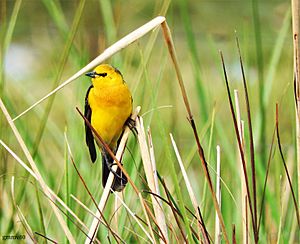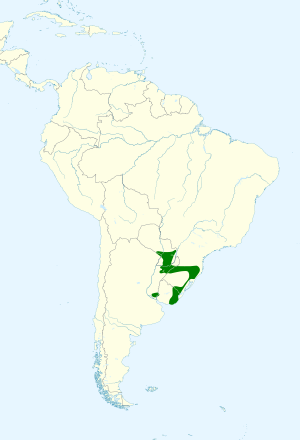Saffron-cowled blackbird facts for kids
The saffron-cowled blackbird (Xanthopsar flavus) is a beautiful bird that belongs to the Icteridae family. This family includes many types of blackbirds, orioles, and meadowlarks. What makes this bird special is that it's the only species in its group, called a monotypic genus, named Xanthopsar.
Quick facts for kids Saffron-cowled blackbird |
|
|---|---|
 |
|
| Conservation status | |
| Scientific classification | |
| Genus: |
Xanthopsar
|
| Species: |
flavus
|
 |
|
| Synonyms | |
|
Agelaius flavus Gmelin, 1788 |
|
Contents
About the Saffron-Cowled Blackbird
The saffron-cowled blackbird gets its name from its bright yellow head, which looks a bit like a saffron spice color. The rest of its body is mostly black. These birds are known for their striking colors. They were first described in 1788 by a scientist named Johann Friedrich Gmelin.
Where Do They Live?
These birds live in South America. You can find them in several countries. These include Argentina, Brazil, Paraguay, and Uruguay. In Uruguay, they are especially found in a place called the Quebrada de los Cuervos.
Their Favorite Places to Live
Saffron-cowled blackbirds like specific types of places to call home. Their natural habitats are usually open, grassy areas.
- They enjoy dry lowland grasslands in warm, sunny regions.
- They also live in grasslands that get wet or flooded during certain seasons.
- Sometimes, you can spot them in pastureland, which are fields where farm animals graze.
These areas provide the food and shelter they need to survive.
Why Are They in Danger?
Sadly, the saffron-cowled blackbird is a threatened species. This means their numbers are decreasing, and they could disappear if we don't protect them. The biggest reason for this is habitat loss.
Understanding Habitat Loss
Habitat loss happens when the places where animals live are destroyed or changed. For the saffron-cowled blackbird, this means their grasslands are disappearing.
- People might clear grasslands to build farms or cities.
- Sometimes, natural areas are changed for other human activities.
- When their homes are gone, these birds struggle to find food, safe places to nest, and mates.
Protecting their grasslands is very important to help these beautiful birds survive.
See also
 In Spanish: Tordo amarillo para niños
In Spanish: Tordo amarillo para niños


